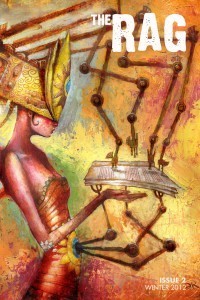Dan Reilly's Blog, page 2
April 13, 2012
The Rag #2: No Control

The Rag Winter 2012
The Rag, Winter 2012 Issue
Power & control. Who has it, who wants it, and who wants to lose it? This is the focus of many of the Winter 2012 selections. This is an era where our society’s innovations and technology, rather than imparting to us increasing freedom and control over our lives, instead exert increasing control over us. This theme is perhaps visualized the fullest in Garth von Buchholz’ sci-fi story “Make Mad the Roaring Winds,” which follows Darcy Lim, a human resources officer who’s wrapping up a very long commute–a 3-year journey to a colony on one of Jupiter’s moons. Trapped in his solitary space capsule on an immoveable trajectory towards its destination, Darcy’s fighting to gain a modicum of control over his life and destiny, and suicide or insanity have come to look like decent options.
“They can watch me, they can listen to me, they can read my writing and they can even monitor my bio functions, but they can’t read my thoughts. It’s the last dominion of human privacy, the limitless playground where anything can be formulated and anything can be materialized. And if your thoughts are wise enough, and strong enough, well, they can even begin to give you powers that no one knows you have.” — from “Make Mad the Roaring Winds” by Garth von Buchholz
With so many literary publications coming and going in today’s market, it’s hard to know which ones are worth your time, let alone your money. That’s why we’ve made available an entire issue of our magazine free of charge in an easy-to-download PDF. We stand by the quality of the work we publish, and we believe that most of the readers who will take the time to check out our sample issue will likely subscribe. So your first issue is on us.
Check out some video readings from the winter stories on YouTube. We have a video of Lynn Levin reading from You Take Care Now, Mary Jones and Dan Reilly reading from Timothy Ghorkin’s D-Gen.
Short Fiction
Zombie Night by Justin Reed
Make Mad the Roaring Winds by Garth von Buchholz
Kill Whitey by Wes Trexler
A Clash by Melissa Ragsly
Into the Light by C.R. Penn
D-Gen by Timothy Ghorkin
You Take Care Now, Mary Jones by Lynn Levin
The Leaves are Falling by Tony Zito
Poetry
Elkhart, Indiana and Coney Island in Limbo by Lisette Eileen Cheresson
Elegy for the Skid Row Men of Old Portland by Nathaniel Hunt
What to Expect by Sarah Bridgins
Featuring original art from Alex Eckman-Lawn and Veronica Chen. Cover art by David Rankin.
New York Occupation
[image error]

JW Yates
JW Yates
1-13-12
New York City, New York
What do you even call this thing? A movement? A protest? An insurrection?
The Occupation has already infiltrated the American zeitgeist and changed the national political dialogue in a way that nobody could have predicted. The mainstream media has danced around the subject in a bizarre tango of neglect and hype, leaving the truth standing by as a wallflower.
At this point, the particular politics of Occupy Wall Street are less important than the ugly street-level reality that they’ve stirred up. The occupation of a few public spaces in downtown Manhattan by a rag-tag group of idealists and rabble-rousers has been met with a full-bore siege of martial law.
The Police State is now on open display in New York City. For the past few months, everyone’s favorite private army, aka the NYPD, has been instituting “frozen zones” at will and without warning, shutting off pedestrian traffic with no explanation, demanding corporate IDs, and arresting anyone who tries to cross the street or defy their random checkpoints (members of the press and legal observers included). All First Amendment rights to free assembly and free expression are now routinely sequestered; unique classes of people are created ad hoc on the street as corporately-funded police officers brutally crack down on dissent and protest of all kinds. Block after block of the Financial District are now barricaded into a meaningless maze of metal fences and observation towers all-too reminiscent of fascists regimes from past decades.
In today’s NYC, you are either a regular citizen, subject to arrest and denied entry to public spaces (like Wall Street and Broadway), or you are a corporate person–one who has the permission of the corporate authorities, and full access to the streets of Manhattan.
I’ve been arrested three times in the past two months. Once for praying, once for walking, and once for stepping out of the way of a rampaging cop. To their credit, the cops only beat me up one time.
Having lived the fast life of an underground outlaw/artist for the past fifteen years, my criminal record remained clean and clear until I started speaking my mind about politics and religion in public. I’m not even particularly supportive of the specific brand of light-socialism espoused by the OWS crew, but my disdain for fascism, and my dedication to the cause of free speech, has brought me into a toe-to-toe struggle against the militarized authorities of New York City.
Nobody knows what the political fallout of the OWS movement will be, but, after trolling through the guts of today’s class struggle, I’m certain of one thing: artists, writers and others who take their civil rights for granted are in for a sour treat when this wave of repression hits Mainstreet, USA. If the tactics of brutality and suppression used by Mayor Bloomberg and the NYPD get exported to the tidy, boring suburbs of middle-America, we will all know how thin the veil of civility has become in our society. It is no longer sufficient to grumble about inequity and the need for change at cocktail parties and in safe places with friends. If you value your right to speak out and express yourself in an unhindered way, it may now be essential for you to hit the streets and demand those rights in public, before it is no longer possible to do so.
Maybe we will look back in a few decades and see OWS as a glorified internet meme, or maybe it will be seen as the lit fuse leading to the powder keg of revolution, either way it is the duty of the artist to look at their world critically and tell the story of what they see. If all you see comes from cable news or corporate-sponsored print rags, you may want to take a step outside and check the weather yourself.
December 4, 2011
Submission Fees
In the few short months since we’ve launched our magazine, one of the questions that keeps coming up is why we charge $3 for online submissions. We figured it’s time to take a deeper look into this topic, as submission fees are somewhat of a controversial issue in the literary community.
When we decided to start our magazine we considered several delivery options for accepting submissions, and we ultimately decided that the best option was to model our submission process after magazines we’d submitted to ourselves, like The Missouri Review, who recently wrote their own blog entry on this subject. So far it’s worked well, and authors definitely seem to prefer submitting online, even with the small fee, to mailing their submissions, as 98% of the submissions we receive are submitted to us through our paid online medium.
Now of course we understand that virtually all writers would prefer to submit electronically for free, as it’s easy, convenient and there is no cost involved. While we have no desire to make submitting costly for writers, from our perspective as publishers there are big problems with opening ourselves to free online submissions; and those problems primarily come down to volume and quality.
In the past, before there was any such thing as the Internet, submitting work for publication required not only money for postage and printing, but it also took a considerable amount of time—i.e. formatting and printing, producing an SASE, dragging yourself to the post office etc. As it turns out, that cost—i.e. time and money—moderates consideration. That is, if the process bears a cost to you, then you’re more likely to do some research to see which magazines are best-suited for your work before submitting. Similarly, paid online submissions have the same effect. Although they’re more convenient than printing and making a trip to the post office, there’s still a cost to consider. If the online process were free, and as simple as copy, paste, send, it never hurts to take a shot, so why not send that 18th Century period piece to the magazine that calls for gritty stories about the modern world? This simplifies things of course, but it’s undoubtedly true that free submissions cause volume to go up without a corresponding increase in quality.
So now let’s look at it from the author’s standpoint. If a magazine that used to receive 4,000 paid submissions/year, is now receiving 20,000 free online submissions/year, who does that benefit? Although the writer pays nothing, and can now afford to submit to more publications, they’re now swimming not in a lake but in an ocean, and the chances of someone finding them in that ocean are now much smaller.
One of the things we strive for at The Rag is discovering new talent. We base our publication decisions on the piece of writing that’s in front of our eyes, not on bylines, or how famous the author is. So if you’re a new writer, your chances of being noticed by a publication that has some moderating filters to its submission process are probably much higher than those that don’t. As it stands, our submission volume is manageable and we can give each story equal consideration.
Now let’s get down to what’s on everyone’s mind—that green stuff: money. It’s what makes the world go around. Or at least it’s what makes us go around spinning our wheels in the muck of Capitalism. Either way, it’s a necessary evil. Our overriding goal at The Rag is to pay writers. For some writers, submissions fees are anathema; for us, not being paid is anathema. One of our primary decisions in moving forward with our publication was that if we couldn’t pay writers, we didn’t want to run a literary magazine. That’s the whole point. Get the cash flowing. Distribute some wealth, even if it’s nothing more than enough cash for a week’s worth of groceries, at least it’s something that gives the writer a reason to keep moving forward.
The online submission fee advances that goal. With mailed submissions, the money the writer spends goes to the post office and to the print and paper manufacturers. With online submissions fees, that money stays in the literary community. That, to us, is a win-win situation. Writers can still submit to us through the mail at no additional charge beyond printing and postage expenses, but if they choose to submit online, whether that’s because it’s cheaper, more convenient, or if they just don’t mind sending some financial support our way, then the money increases our revenue and increases what we can pay our writers. It’s that simple.
The submission fee debate is an interesting one, and it’s possible to put forward logical arguments on each side. Certain people we come across, however, like to confront us with arguments that are nothing more than troll-logic. They email us to tell us we’re “scammers” who’re taking advantage of “gullible” authors. They’re apparently the only ones brilliant enough to see through our scheme and need to protect the other writers, who are all mildly-retarded or, at best, hopelessly naïve.
Indeed, we’re living the good life off of authors’ hard-earned cash. We spend many of our days drinking Martinis made from Banker’s Club Vodka and premium olives—not those generic supermarket olives. The Whole Foods shit—Organic motherfucking olives. As everyone knows, running a literary magazine is a sure ticket into the 1%. We enjoy driving past Occupy protests and throwing $3 out the windows of our limo for the degenerates to pluck from the pavement. We’re currently lobbying the Fed to issue and circulate a $3 bill so that it’s easier for us to count all our fucking money. Seth even has a vanity plate on the back of his Prius that says “3-RIPS.” We buy our Coke by the pound. Good times, I tell you.
But seriously, we’d like to make it known that we greatly appreciate the support we’ve received so far, both through submissions and subscriptions. Hopefully, this answers some questions concerning why we chose our current methods of accepting submissions. We are open to change and new ideas, and we’re constantly looking for ways to improve our methods. So we welcome civil debate on this and other subjects.
October 26, 2011
We liked your story. We really liked it. But we’re not going to publish it. Bye.
When submitting to literary magazines, it’s rare to get more than a form rejection letter in the event your work isn’t published. At The Rag, for better or worse, we’re not a whole lot different here. If you’re new to the literary submission game, don’t let this discourage you. There are specific reasons why it’s generally not possible or advisable for us to give you more than a simple “no”, politely phrased.
The biggest concern from our end is time. As in, there’s not enough of it in the day. I’ve considered trying meth. I hear you can stay awake for days on that shit. Drawbacks exist. I’ve watched Cops. I’ve ridden the MAX. I’ve seen the dental problems, the sores, the twitching, the homelessness.
Barring massive amphetamine use, it’s just not possible to provide a personalized response on every submission we receive and decline. Which brings us to another point: do writers want a personalized response? Some actively dislike receiving feedback. It’s something that makes you second-guess your writing, or, if there’s a positive statement, then it’s just frustrating: “If you liked it so much, why didn’t you publish it? Asshole.” So that’s the other main reason we generally refrain from providing unsolicited feedback.
There are times when we will provide more than the standard “no” reply. If we have a particularly strong opinion about an aspect of a story, we may point it out. Also, while we’ll never be able to send personalized responses to everyone, if a writer specifically asks for feedback, we will try our best to honor the request. So if you are particularly looking for some commentary in the event of a decline, you can certainly ask.
To summarize: if you get basic rejection letter, telling you we aren’t going to publish your story in The Rag and nothing more, take it for what it is, a simple rejection, which places you in the elite company of every writer who has ever written. It doesn’t mean we hated your writing and have nothing good to say about it. It doesn’t mean we didn’t strongly consider it. It doesn’t necessarily mean anything more than that we’re blithering idiots who’ve just passed up an opportunity to publish something brilliant. And if you really want to know more about what we thought of your story or poem, let us know, and we’ll accommodate the request to the best of our abilities.




